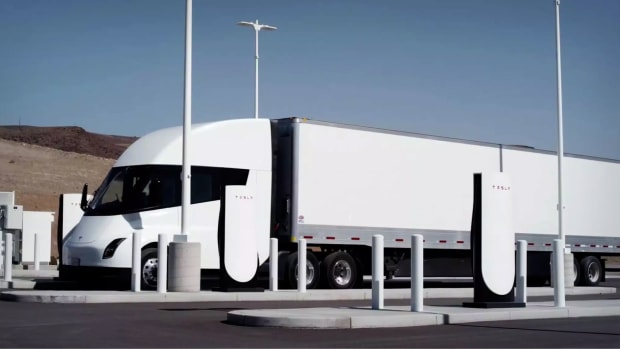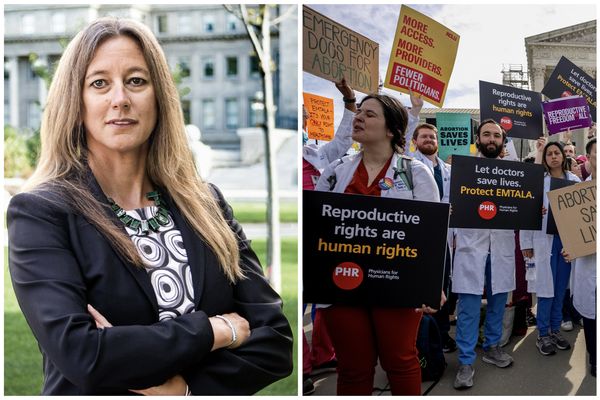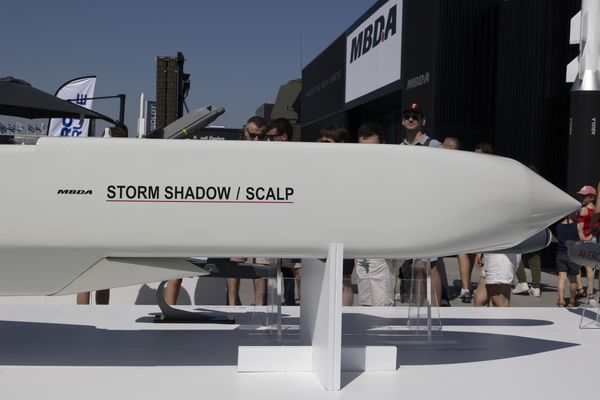It's no secret that Ford Motor Co. (F) has been busy developing its battery electric vehicle models to compete against the industry leader Tesla (TSLA), as well as a whole lineup of competitors, including General Motors (GM), Volkswagen, BMW, Mercedes Benz, Hyundai, Rivian (RIVN), and Nio (NIO).
The Dearborn, Mich.-based automaker has launched electric versions of some of its most popular internal combustion engine models, including the Ford Mustang Mach-E and the F-150 Lightning pickup truck.
As the iconic automobile manufacturer expands into the EV market, it is looking to branch out further into the alternative energy work truck market as well.

Tesla
Tesla's Newest EV Coming Soon
Tesla's CEO and co-founder Elon Musk has already signaled that the company will begin shipping its newest electric vehicle later this year, its Tesla Semi truck with a 500-mile range. The Tesla Semi, which the company first revealed in November 2017, reaches 60 mph in 20 seconds, according to Tesla's website.
In addition to the Tesla Semi, competitor Nikola Motors is developing three semi-truck models, Tre Bev, Tre Fcev, and Two Fcev.
With the competition for EV semi-trucks increasing ever so quickly, Ford does not want to be left behind. That's why on Sept. 13, the company revealed a new partnership with Ferguson Enterprises (FERG) , a distributor of plumbing supplies, waterworks and fire and fabrication products, to launch a pilot program for Ford's F550 Fuel Cell Prototype Chassis Work Truck that uses hydrogen to power its fuel cells.
"Ford's strategy to reduce carbon emissions across the globe includes investigating multiple technologies that will help us achieve these goals across a broad spectrum of applications," Jim Buczkowski, executive director of Ford Research and Advanced Engineering said in a statement. "This collaboration with Ferguson is a strong example of where our Ford Pro business and the potential of fuel cell propulsion systems might address the application gaps that battery electric vehicles just can't fulfill. The potential of hydrogen, the most plentiful element on the planet, coupled with fuel cell technology has tremendous potential to power larger, heavier commercial vehicles while still delivering zero tailpipe emissions."
Pilot Program for Ford's F550 Fuel Cell Prototype
The pilot program will evaluate how fuel cell technology will operate within the Ferguson fleet, while providing real-world usage data to Ford, the Newport News, Va., company said. Ferguson will provide Ford with vehicle data and feedback about the technology to help Ford better define the engineering requirements for commercial vehicle duty cycles.
Ford will study the data for ongoing industry challenges within the medium-duty and heavy-duty work truck segments, like battery range and payload capacity, that have prevented faster conversion to environmentally friendlier options.
"We are taking a proactive approach to meeting the challenge for a more sustainable future, recognizing the critical role fuel-efficient trucks play to keep American businesses running," Ferguson CEO Kevin Murphy, . "We are pleased to announce this innovative collaboration with Ford to help improve alternative fuel options in their medium-duty fleet, in line with our overall corporate sustainability strategy to reduce our Scope 1 and 2 emissions."
Ferguson previously announced another pilot program to launch 30 class 6 through 8 all-electric delivery trucks in its fleet in collaboration with Holman and Electrada. The turnkey fleet management and electrification solutions enable Ferguson to deploy medium- and heavy-duty all-electric vehicles throughout California while streamlining the development of the necessary charging and energy management infrastructure.







